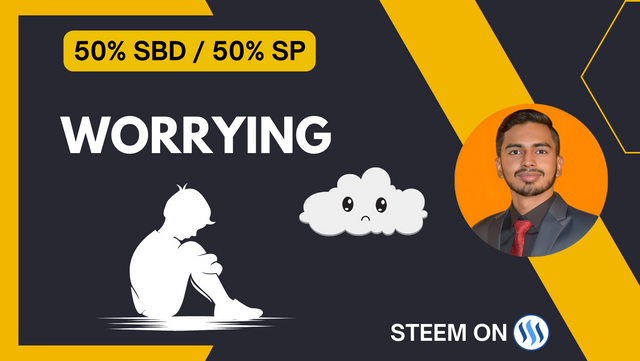
Worry can be defined as an emotion characterized by anxiety, unease, and distress. It is often caused by something perceived to be outside one's control.
I believe a small degree of worry is common for everyone. However, excessive worry can become harmful since increases stress and negatively affects health. Constant worrying can prevent sleep and cause headaches.
Excessive worry can also impact work performance. The inability to concentrate leads to mistakes, and ongoing fatigue leads to poorer judgments. If left unchecked, depression may set in. Thus, it is important to minimize worry as much as possible.

Some people develop a destructive habit of worrying constantly about minor issues. This is detrimental since excessive worry takes an internal toll over time. While everyone faces challenges occasionally, one should try not to be consumed by worry.
My advice for those troubled by persistent concerns is to first reflect on the situation, then try to develop solutions. However, if the issues remain unresolved, accept that matters often resolve themselves with time. There will always be ups and downs in life. The critical thing is to remember that you are not alone, and every problem ultimately finds a solution.
Moderately concerning oneself with an issue can sometimes aid in problem-solving. For example, unless you worry to some degree about unemployment, you likely won't be motivated to explore new job opportunities or improve your resume. Some degree of tension keeps one alert and engaged.

However, chronic and extreme worry often accomplishes the opposite, overwhelming the mind's ability to think clearly or make sound decisions. Those prone to intense worry may become depressed and even less equipped to navigate challenges. Therefore, while some concern is beneficial to remain focused on resolving matters, fixation beyond reasonable levels is unwise. Try to find balance – address difficulties without becoming so emotionally consumed that the worrying itself becomes an unnecessary source of distress.
Financial and work troubles – Job loss or a struggling business creates perhaps the greatest source of concern for most. Insufficient income to cover expenses also generates substantial stress.
Health issues and caring for others – Caring for loved ones, especially those dealing with declining health or hospitalization, leads to heightened anxiety. One’s own health woes also weigh heavily on the mind.
Future uncertainties – Many excessively preoccupy themselves with concerns over their children’s future or career. Relationship status also triggers much fretting.
Physical effects – sleep loss, poor appetite, headaches, and gastrointestinal issues.
Mental health disorders – especially elevated risks of anxiety, depression and addiction disorders.
Performance declines – Impaired concentration and decision-making abilities negatively impact work and relationships.
The first thing is that to get relief from worry and anxiety, it is most important to gain control over your mind. Worries will keep bothering you until you are able to stop them. Practices like mindfulness and meditation are very helpful here. With their help, you can learn how to rein in your thoughts.

Second good thing is to exercise. Be sure to exercise properly for at least 30 minutes daily, whether it is walking, running, or any other physical activity. Exercise has scientific benefits like improved mood and motivation, increased confidence, and better sleep and appetite. All these things will aid in reducing anxiety.
The third thing is to maintain a routine. Have a proper routine mapped out for the 24 hours of the day, such as waking up, eating, working etc. A chaotic routine increases stress and worry. Balance everything in your routine, like taking some time for yourself along with work. Spend time with family and friends. All these things will reduce stress.
The last thing is that it is very important to share your worries. Talk to someone who can understand you and also give advice. This will lighten your load and help you solve your problems.

Hola amigo intentaré participar y gracias por la invitación.
Downvoting a post can decrease pending rewards and make it less visible. Common reasons:
Submit
TEAM 5
Congratulations! Your comment has been upvoted through steemcurator08.Downvoting a post can decrease pending rewards and make it less visible. Common reasons:
Submit
Thanks for the support @josepha. I really appreciate that. 😊
Downvoting a post can decrease pending rewards and make it less visible. Common reasons:
Submit